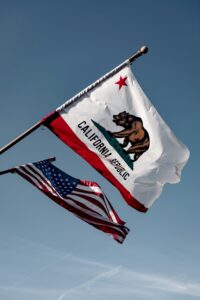April 9, 2015
 After amending its application with the U.S. Patent and Trademark Office (“USPTO”) to show that its Tangerine Wheat Ale had acquired distinctiveness in the marketplace, California-based Table Bluff Brewing Inc. d/b/a Lost Coast Brewery (“Lost Coast”) was granted a federally registered trademark in 2014 (No. 4509582) for the phrase TANGERINE WHEAT for use in connection with the marketing and sale of beer. Less than a year later, armed with its newly minted registration, Lost Coast delivered a trademark cease-and-desist letter to Seattle brewery Peddler Brewing Company LLC (“Peddler”) which, in response, has since chosen to rebrand its Tangerine Wheat beer.
After amending its application with the U.S. Patent and Trademark Office (“USPTO”) to show that its Tangerine Wheat Ale had acquired distinctiveness in the marketplace, California-based Table Bluff Brewing Inc. d/b/a Lost Coast Brewery (“Lost Coast”) was granted a federally registered trademark in 2014 (No. 4509582) for the phrase TANGERINE WHEAT for use in connection with the marketing and sale of beer. Less than a year later, armed with its newly minted registration, Lost Coast delivered a trademark cease-and-desist letter to Seattle brewery Peddler Brewing Company LLC (“Peddler”) which, in response, has since chosen to rebrand its Tangerine Wheat beer.
How was Lost Coast able to successfully navigate the USPTO’s Office Action and stake its claim to the TANGERINE WHEAT name?
Trademark Registration and Acquired Distinctiveness
The USPTO only grants trademark registration on its Principal Register to marks that are distinctive with respect to the applied-for goods and services. A mark’s distinctiveness is placed into one of five categories:
- Fanciful marks are invented for the sole purpose of functioning as trademarks (e.g., PEPSI and EXXON).
- Arbitrary marks comprise words that are in common linguistic use but, when used to identify particular goods or services, do not suggest or describe a significant ingredient, quality or characteristic of the goods or services (e.g., APPLE for computers).
- Suggestive marks, when applied to the goods or services at issue, require imagination, thought or perception to reach a conclusion as to the nature of those goods or services (e.g., CITIBANK for financial services).
- Merely descriptive marks describe an ingredient, quality, characteristic, function, feature, purpose or use of the specified goods or services (e.g., GENERAL MOTORS for automobiles).
- Generic terms are understood primarily by the relevant purchasing public as the common or class name for the goods or services (e.g., BEER for beer).
On one hand, fanciful, arbitrary and suggestive marks are considered inherently distinctive and may be registered on the Principal Register without proof of “secondary meaning.” On the other hand, generic terms are incapable of functioning as registrable trademarks denoting source and cannot be registered on either the Principal or Supplemental Registers.
A descriptive mark, which falls in the middle, may be registered on the Principal Register only upon proof of acquired distinctiveness (also known as secondary meaning) – that is, proof that the mark has become distinctive as applied to the applicant’s goods or services in commerce. Evidence may include:
- verified statements of substantially exclusive and continuous use by the owner during the preceding five years;
- claim of ownership of similar marks on the Principal Register; and
- actual evidence of acquired distinctiveness, such as advertising expenditures, surveys and affidavits asserting recognition of the mark as a source indicator.
TANGERINE WHEAT Trademark Application
Lost Coast filed the trademark application TANGERINE WHEAT for beer in May 2013. Two months later, the application hit a snag when the examining attorney filed an Office Action refusing registration. He declared the word WHEAT to be a generic term for wheat beers and found that the mark as a whole was merely descriptive for beer.
In its response, Lost Coast stated that its Tangerine Wheat Ale was first sold in July 2006 and that its use of the name was substantially exclusive and continuous during the seven-year period before its application. Additionally, the brewery provided evidence that the purchasing public identifies the TANGERINE WHEAT mark with Lost Coast’s Tangerine Wheat Ale, including a list of awards and prizes won at festivals and craft beer events. Lost Coast also amended its application to claim acquired distinctiveness under Section 2(f) of the Lanham Act. Shortly after receipt of Lost Coast’s response and amendment, the USPTO published TANGERINE WHEAT for opposition, ultimately granting the registration in April 2014.
Take One Down . . . Lost Coast’s Trademark Cease-and-Desist Letter
Peddler is a two-year-old Seattle microbrewery and tasting room with only three employees. The small business brews a dozen or so beers, which it distributes to about three dozen stores (all within 15 miles of its storefront). One of its most popular beers went by the name of “Tangerine Wheat.”
In December 2014, only eight months after the USPTO granted the TANGERINE WHEAT registration, Lost Coast delivered a cease-and-desist letter to Peddler, demanding that the smaller brewery stop using the TANGERINE WHEAT name. Rather than contesting the matter, Peddler recently chose to change the name of its Tangerine Wheat beer to “Tangerine Hefeweizen.” Purportedly, Lost Coast is allowing Peddler to sell its remaining stock of bottles bearing the Tangerine Wheat label.
Survive Registration. Then Protect Your Trademark.
Lost Coast’s experience at the USPTO demonstrates some of the difficulties that owners of descriptive brands may face during the trademark application process. With the assistance of experienced legal counsel, merely descriptive marks are often capable of overcoming the USPTO’s roadblocks and successfully proceeding to registration. Likewise, Lost Coast’s apparent victory over Peddler illustrates the value of a federally registered trademark when protecting a valuable word, phrase, symbol or design.
If you need assistance with establishing acquired distinctiveness for a pending application for trademark registration, have been served with an Office Action or notice of opposition, or if you have discovered a third party using your brand without permission, please e-mail us at info@kleinmoynihan.com or call us at (212) 246-0900.
The material contained herein is provided for informational purposes only and is not legal advice, nor is it a substitute for obtaining legal advice from an attorney. Each situation is unique, and you should not act or rely on any information contained herein without seeking the advice of an experienced attorney.
Attorney Advertising
Related Blog Posts:
Klein Moynihan Turco Scores Major Trademark Infringement Win



